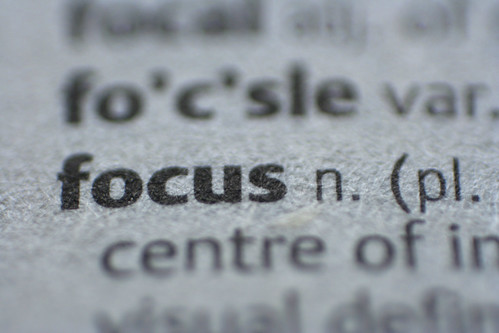2 Proven Tricks For Focusing Your Mind And Increasing Performance
sitive self-talk and positive mental imagery: Self-leadership theory can be described as the 'process of influencing oneself' as opposed to the influence of leaders over followers (Manz, 1983, 1986). We focus on and develop a model for a particular aspect of self-leadership - thought self-leadership emphasizing two primary elements, self-talk and mental imagery. The major thrust of this model is that employees can influence or lead themselves by utilizing specific cognitive strategies that focus on individual self-dialogue and mental imagery.…
3 minutes
Do you need a “to-do” list or a “not-to-do” list?
m Collins, author of Good to Great: Why Some Companies Make the Leap... and Others Don't, makes an interesting suggestion -- you may need to worry less about your to-do list and focus on a "stop doing" list: Rochelle's lesson came back to me a number of years later while puzzling over the research data on 11 companies that turned themselves from mediocrity to excellence, from good to great. In cataloguing the key steps that ignited the transformations, my research…
2 minutes
If talking to yourself improves performance, what should you be saying?
at you need to know: Talking to yourself does help performance. Self-talk is best used in trying to learn new skills than covering things you are already familiar with. In terms of physical activity, it helps more with fine, subtle tasks than big movements. Via Eurekalert: But the researchers teased out more - different self-talk cues work differently in different situations. For tasks requiring fine skills or for improving technique "instructional self-talk", such as a technical instruction ("elbow-up" which Hatzigeorgiadis…
2 minutes
How To Instantly Get Smarter
tting people to think about professors (or other stereotypically smart groups) improved their smarts for 15 minutes. The reverse was true too: getting people to think about stereotypically stupid people reduced performance. The authors tested and confirmed the hypothesis that priming a stereotype or trait leads to complex overt behavior in line with this activated stereotype or trait. Specifically, 4 experiments established that priming the stereotype of professors or the trait intelligent enhanced participants' performance on a scale measuring general…
1 min read
Can combing your hair improve your grades?
ybe. Grooming is associated with higher GPA's. Could be that those who are conscientious about their appearance are also more on top of their schoolwork. Then again, combing your hair might get you better grades if the correlation is due to teacher bias toward attractive or conscientious-looking students, something the researchers do mention: Using data from the National Longitudinal Study of Adolescent Health (Add Health), we investigate whether certain aspects of personal appearance (i.e., physical attractiveness, personality, and grooming) affect…
2 minutes
The Main Reason Most People Are Late For Work
ntext. Does everyone else come in late? If so, it doesn't seem so bad: The authors investigated the joint influence of contextual factors and individual attitudes on employee lateness in a field setting. Hierarchical regression analyses based on objective lateness data revealed that perceived lateness climate moderated the relationship between individual lateness attitudes and lateness behaviors. Specifically, as hypothesized, individual attitudes toward lateness were stronger predictors of actual lateness frequency in lenient climates. This moderating effect was observed when controlling…
1 min read
What’s a trick we can use to make sure we do the right thing?
niel Akst, author of We Have Met the Enemy: Self-Control in an Age of Excess, has a piece in Slate where he explains how we can use "precommitment devices" to rein in desire: How can you use precommitment to keep yourself from giving in to unwanted desires? You're probably already doing so—for example, by asking your significant other, on the way to a restaurant, not to let you order dessert when you get there. Dan Ariely, that tireless student of…
2 minutes
3 Ways Bubble Gum Can Dramatically Improve Your Life
Yes, gum can make you smarter: Recent reports suggest that enhancement of memory performance while chewing gum is a fairly robust phenomenon. The processes underlying the effect are not known, but may involve glucose delivery, context-dependent effects and arousal mechanisms amongst others.This brief commentary outlines the main findings from these studies and raises some issues regarding interpretation, methodology and future research directions. Source: "Chewing gum and cognitive performance: a case of a functional food with function but no food?" from Appetite 43 (2004)…
3 minutes








